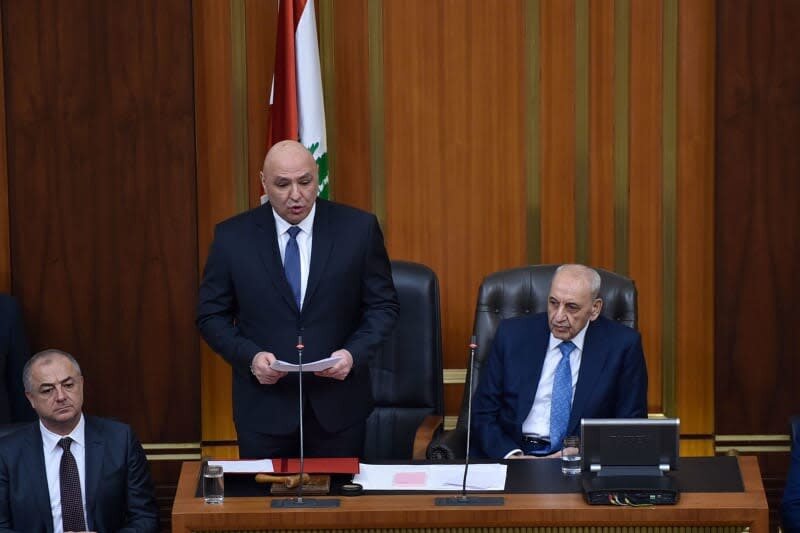Will US, co-conspirators force Israel to leave from Lebanon’s lands after appointing Aoun?

SOUTH LEBANON - On his first working day after being elected president, President Joseph Aoun called for binding parliamentary consultations next Monday to name the prime minister-designate to form the next government.
External pressures, however, suggest that Najib Mikati will keep the post until May 2026, the date of the next parliamentary elections.
During his visit to Beirut, Yazid bin Farhan, the Saudi envoy, had reportedly made clear the prime minister that Riyadh and the five-member committee favour.
The five-member committee includes representatives of Saudi Arabia, Egypt, Qatar, the US and France.
Meanwhile, Hezbollah-Amal Movement duo, in addition to the Marada Movement and the Socialist Party would apparently nominate Mikati unlike the Free Patriotic Movement, the Lebanese Forces and the Kataeb Party.
Several prominent Sunni figures have expressed their dissatisfaction with Samir Geagea, the head of the Lebanese Forces, nominating MP Fouad Makhzoumi to head the government. They affirm that it is unacceptable for a Christian leader to impose the nomination of the prime minster.
Since the 1990s, after the end of the civil war and the signing of the Taif Agreement, political sectarianism has given the presidency of the republic to the Maronites; the speaker of the parliament to the Shiites; and the post of prime minister to the Sunnis.
Although the Taif Agreement has not distributed ministries among the sects, customs imposed the rotation of the 4 sovereign ministries (foreign affairs, interior, finance, and defense) among the four major sects (Maronites, Sunnis, Shiites, and Orthodox). Legally speaking, when customs are repeated, “they acquire the force of a legal basis.”
Before heading to Damascus, ending a 13-year official rift between the two states, Mikati had noted that Lebanon’s new cabinet must be able to implement Aoun’s roadmap to save the country.
Mikati, the first Lebanese official to meet the new Syrian government, had already contacted Ahmed al-Sharaa (al-Julani) about a month ago, but he obviously postponed the visit until he received Riyadh and Washington’s approval.
Meanwhile, the families of the anti-Takfiri martyrs have expressed their resentment over Mikati’s ignorance of al-Julani’s crimes in Lebanon, especially in early August 2014, when his gunmen attacked Lebanese army positions in Arsal, on the northeastern Lebanese border with Syria, killing about 20 soldiers and kidnapping others, along with various assassinations and terrorist bombings in various Lebanese regions.
Currently, a more serious challenge looms, i.e. the ongoing Israeli violations of the ceasefire agreement, especially since the enemy under the pretext of avoiding a repetition of the October 7 scenario, is following an expansionist doctrine aiming at securing a wide buffer zone on its borders.
An article in Maariv has recalled Zionist theorist Ze’ev Jabotinsky’ suggestion that “the only way that will make the Arabs agree to recognize the right of the Jews to establish their state is by building a huge iron wall.”
The article added: “In order for Israel to perpetuate its existence, the most important lesson learned after October 7 is the need to create buffer zones behind our borders, like the security belts that were recently established in Gaza, southern Lebanon and the eastern Golan Heights,” noting that the move “will require massive investment in: combat means; technological capabilities; and human development.”
In turn, Amir Avivi, an Israeli reserve brigadier general, spoke at length to Channel 7 on “the threat posed by Hezbollah,” recalling the statement of Hezbollah’s Secretary General Sheikh Naim Qassem that “if Israel continues its attacks and breaches the ceasefire, Hezbollah will respond.”
Avivi claims the reason Tel Aviv has not asked its colonial settlers to return to the northern occupied Palestinian territories “is that the situation is still fragile and completely unstable. It is not clear whether the ceasefire will continue. It is difficult to assess the situation.”
Avivi linked the developments mainly to “Trump’s return to the White House,” acknowledging the Israeli occupation of “many areas beyond the border fence.”
Whilst Lebanon’s ministries of foreign affairs and agriculture has asked the country’s Permanent Mission to the United Nations to file a complaint before the UN Security Council condemning the Israeli ongoing attacks on the Lebanese agricultural sector, as a provocative video has gone viral revealing the Israeli army’s theft of old olive trees from southern villages.
Hebrew reports revealed that “it is likely that Israel will not allow the southerners to return until next March, after the settlers return to their settlements.”
As the five days set by the Lebanese Army to deploy forces in the western sector came to an end, the enemy did not just procrastinate in withdrawing, but continued its violations, carrying out bombings in
Al-Jabin and Aita al-Shaab. It also launched a raid on the vicinity of Tayr Dibba, killing five citizens and wounding others. It then continued targeting fire engines, which collided with a car, leading to the killing of two other citizens.
Amos Hochstein, the US envoy to West Asia, has not guaranteed that the occupation regime’s violations of UN Security Council Resolution 1701 would stop, but rather justified—like Jasper Jeffers, the US general who heads the committee—what the enemy is blatantly committing.
Commenting on the election, Walla claimed that the process is “a major achievement for the pro-Western camp in Lebanon and a blow to Hezbollah and the pro-Iranian bloc in the region,” pointed out that delaying the Israeli withdrawal from southern Lebanon “could harm Aoun shortly after he takes office.”
Walla quoted a senior US official as stating that “if Israel does not withdraw and violates the (ceasefire) agreement, it will find itself in conflict with the international community… The Israelis will soon receive a message that they must come to terms with reality and that there is no chance to remain in Lebanon.”
Leave a Comment